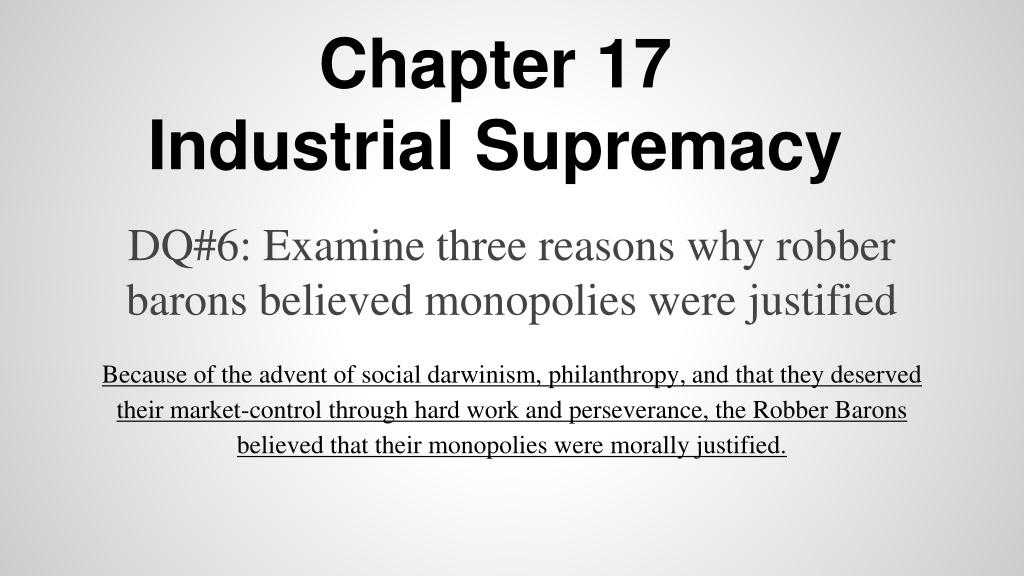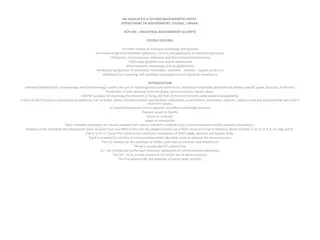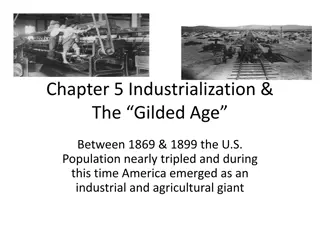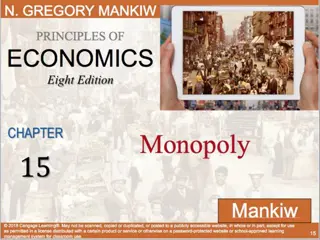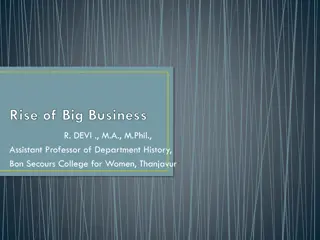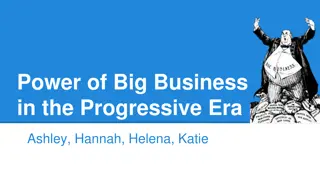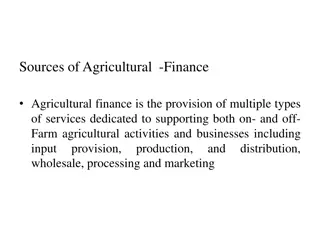Exploring Robber Barons and Monopolies in Industrial Supremacy
Robber barons in the late 1800s believed monopolies were morally justified due to social Darwinism, philanthropy, and their perceived right to control markets through hard work. Examples include Carnegie's steel, Rockefeller's oil, Morgan's banking, and Ford's automotive monopolies. Maintaining consumer support was crucial, as monopolies argued they provided high-quality products efficiently. Innovative business tactics and early market investment allowed Rockefeller and Carnegie to dominate their industries, while Ford revolutionized automobile affordability.
Download Presentation

Please find below an Image/Link to download the presentation.
The content on the website is provided AS IS for your information and personal use only. It may not be sold, licensed, or shared on other websites without obtaining consent from the author. Download presentation by click this link. If you encounter any issues during the download, it is possible that the publisher has removed the file from their server.
E N D
Presentation Transcript
Chapter 17 Industrial Supremacy DQ#6: Examine three reasons why robber barons believed monopolies were justified Because of the advent of social darwinism, philanthropy, and that they deserved their market-control through hard work and perseverance, the Robber Barons believed that their monopolies were morally justified.
What is a Monopoly? A monopoly is when a business has exclusive control of the supply or trade in a commodity or service. Examples include Andrew Carnegie s monopoly over the steel industry, John D. Rockefeller s monopoly over the oil industry, J. Pierpont Morgan s monopoly over the banking system, and Henry Ford s monopoly over the car manufacturing industry
The Best Product ...should not be punished All of the monopolies built in the late 1800s to early 1900s were able to maintain their dominion over their markets through the vast support of the consumers who regularly bought the product. Consumers want a cheap, high quality, and easily accessible product, and monopolies argued that because their product provided those attributes for the consumer, the monopoly should not be taken down.
The Best Product John D. Rockefeller had one of the largest monopolies in America because of his innovative business tactics. They allowed him to expand his petroleum product all over America. He absorbed other businesses in Cleveland Ohio, causing his business to expand horizontally He also built his own barrel factories, terminal warehouses, and pipelines to expand vertically. Rockefeller was able to expand his business so rapidly because people wanted his cheaper oil rather than the other companies more expensive oil.
The Best Product Andrew Carnegie owned a monopoly in the steel mill industry because he had been one of the largest investors in the innovations of the market. He had invested all of his money into the development and innovations of the first steel mills in America, allowing him a head start on creating a business that had the best product on the market His early control of the steel industry allowed his company flood the market with product which was superior to his competitors, making him the prominent leader in steel manufacturing and distribution for many years.
The Best Product Henry Ford, owner of Ford Motor Company, also owned a monopoly on an industry he helped create. He was able to make an automobile cheap enough for the general public ($850) The model-T was thousands of dollars below other car manufacturers which is what made more people buy it. His car was so inexpensive because of its cheap and fast manufacturing as well as how many units were put out into the public. Much like money, the more cars there are, the less valuable the cars become. Because of his innovations among the car manufacturing process and his popularity among consumers, he believed that his monopoly was earned and that it should not be tampered with.
Social Darwinism Herbert Spencer, 19th century English philosopher, begins to publish the first texts on Social Darwinism Society benefits from the elimination of the unfit and weak, allowing the strong to gain control In a marketplace, a business that dominates is one that is meant to succeed Ideas gain popular support among American intellectuals Leaders in business adopt Social Darwinism Andrew Carnegie proclaims I remember that a light came in as a flood and all was clear upon reading Spencer Rockefeller states The growth of a business is merely survival of the fittest
Gospel of Wealth The Gospel of Wealth was a book written by Andrew Carnegie in 1901, the same year he had abruptly resigned from his position at is steel mill company. The book elaborated on the idea of people who had gained great wealth and power are also gifted with a great responsibility. Their duty would be to use their riches to advance social progress. Advancement in social progress according to Andrew Carnegie included helping the community and funding projects to aid the poor in their own endeavors.
Gospel of Wealth Horatio Alger writes the Rags to Riches story Stories about poor overcoming adversity and, because of their effort, growing immensely rich Inspires poor to help themselves
Conclusion During America s Gilded Age , a new and never before seen class of citizens rose to prominence, the wealthy, aristocratic, and philanthropic Robber Barons who ran large and powerful monopolies. The Robber Barons justified their monopolistic control of American markets with the relatively new and particularly brutal philosophy of social darwinism, the belief that those who obtain wealth are the most fit to have it, while other members of society on the lower rungs of the social ladder are there because of their own ineptitude. In addition, Robber Barons believed that if they gave back to society, the poor with the will to do so would rise above poverty, morally warranting them to the continuation of their massive companies. Finally the Robber Barons believed their monopolies were earned, that they gained control of their respective markets by offering the superior product. Because of the advent of social darwinism, philanthropy, and that they deserved their market-control through hard work and perseverance, the Robber Barons believed that their monopolies were morally justified.
